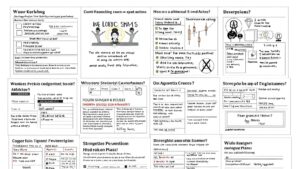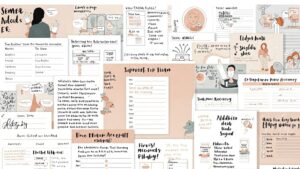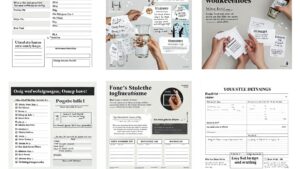Recovery isn’t a passive process – it requires active participation every single day. That’s where addiction recovery worksheets for adults become game-changers, providing the structure and guidance needed to rebuild your life one day at a time. At Ridgeline Recovery, we’ve witnessed how these powerful tools can mean the difference between relapse and lasting freedom.

The Science Behind Recovery Worksheets
Cognitive behavioral therapy research shows that putting thoughts on paper creates tangible neurological changes. When you complete structured addiction recovery worksheets for adults, you’re literally rewiring your brain’s response patterns. The physical act of writing engages different neural pathways than just thinking or talking, making insights more likely to stick.
These worksheets serve multiple crucial functions in the recovery process. First, they help identify personal triggers that might otherwise operate unconsciously. Second, they provide a safe space to process difficult emotions that previously led to substance use. Third, they create accountability by documenting progress in black and white. Finally, they serve as a relapse prevention tool by developing concrete action plans for high-risk situations.
Types of Worksheets That Deliver Results
Trigger Identification and Management Sheets
The most effective worksheets begin by helping you map your personal danger zones. Quality versions go beyond simply listing people, places and things to explore deeper patterns. They guide you to examine the root emotions beneath each trigger, recognize early warning signs, and develop pre-planned responses. Many include sections for tracking successful navigation of triggering situations to build confidence.
Cognitive Restructuring Exercises
Addiction distorts thinking in predictable ways. Cognitive restructuring worksheets help you identify and challenge these automatic thought patterns. Common exercises include spotting “addiction voice” distortions, developing truthful counter-statements, and practicing thought-stopping techniques. The repetition builds new neural pathways that gradually replace old, destructive thinking habits.
Emotional Processing Templates
Many people turn to substances to avoid uncomfortable emotions. Guided emotional processing worksheets provide a safe container to experience and express these feelings. Effective versions help you name specific emotions (not just “good” or “bad”), identify where you feel them in your body, and develop healthy expression methods. Over time, this builds emotional tolerance – a critical recovery skill.
Relapse Prevention Planners
Rather than relying on willpower in moments of crisis, quality relapse prevention worksheets help you create detailed emergency protocols. These typically include your personal early warning signs, step-by-step action plans, support team contact lists, and alternative activities for high-risk times. Having these plans physically written out significantly increases the likelihood of using them when needed.
Integrating Worksheets Into Your Recovery Plan
For those in our PHP Level of Care program, worksheets provide crucial continuity between therapy sessions. Residents in Sober Living Rooms For Rent often use them during house meetings to facilitate meaningful discussions. People attending AA NA Meetings Columbus Ohio frequently adapt worksheet concepts to work through the twelve steps.
The key to success lies in consistent practice. Schedule worksheet time like any other important appointment. Keep them easily accessible rather than buried in a drawer. Review completed sheets regularly to identify patterns and track progress. Most importantly, share your insights with your support team – this transforms solitary work into interactive growth.

Customizing Worksheets for Your Needs
While generic worksheets can be helpful, the most powerful versions are tailored to your specific situation. Consider creating sections that address your unique challenges – whether that’s managing Effexor Addiction withdrawal symptoms or navigating particular social triggers. Many clients find that combining worksheet insights with professional Addiction Treatment creates synergistic benefits.
For those transitioning from a 2 Week Rehab Near Me program, customized worksheets help bridge the gap between intensive care and independent recovery. They provide the structure needed to maintain momentum while developing self-directed coping skills.
The Neuroscience Behind the Process
Writing by hand activates the brain’s reticular activating system, enhancing focus and information retention. The slower pace of writing versus typing allows for deeper cognitive processing of emotional material. Completing worksheets literally builds new neural pathways while weakening old addiction-related connections – a process called neuroplasticity.
Research shows this combination of cognitive engagement and physical action creates more durable learning than passive listening or reading alone. That’s why at Ridgeline Recovery, we incorporate worksheets into all levels of Addiction Recovery care, from initial detox through aftercare planning.
Overcoming Common Worksheet Challenges
Many people struggle with consistency in completing worksheets. Setting realistic expectations is crucial – even 10-15 minutes of daily work creates more impact than occasional marathon sessions. Others feel frustrated when they don’t know how to answer certain questions, not realizing this confusion often points to areas needing deeper exploration.
Some clients report feeling overwhelmed by the volume of available worksheets. The solution lies in focusing on one category at a time, mastering basic skills before advancing to more complex exercises. Remember, these are tools for your benefit – adapt them to serve your needs rather than becoming enslaved to perfect completion.
Digital vs. Paper: Choosing Your Format
The debate between digital and paper worksheets ultimately comes down to personal preference and practicality. Paper worksheets offer tactile benefits and eliminate digital distractions, while digital versions provide easy organization and accessibility across devices. Many people find a hybrid approach works best – using paper for emotional processing exercises and digital tools for tracking behaviors and triggers.
Regardless of format, the key is choosing what you’ll actually use consistently. Some clients prefer creating their own personalized binders, while others thrive with app-based systems that provide reminders and progress tracking.
Building on Worksheet Foundations
As you progress in recovery, your worksheet practice will naturally evolve. Early exercises might focus on crisis management and basic coping skills. Intermediate work often explores deeper patterns and underlying trauma. Advanced worksheets can help you develop positive life visions and build the skills needed to achieve them.
This progression mirrors the journey we see at Ridgeline Recovery, where clients move from surviving to thriving. The same principles apply whether you’re in early recovery or maintaining long-term sobriety – consistent, structured self-work creates lasting change.

Trivia: The Historical Roots of Therapeutic Writing
Before addressing common questions, consider this historical perspective: The therapeutic use of writing dates back to ancient Greek and Roman physicians who prescribed journaling for emotional distress. Modern research has validated what healers intuited centuries ago – giving form to our thoughts on paper has profound healing power.
Frequently Asked Questions
How do I know which worksheets to start with?
Begin with basic trigger identification and coping skills sheets. Your therapist or counselor can recommend specific exercises tailored to your current needs and recovery stage.
What if I don’t see immediate results from worksheet work?
Like any skill, the benefits accumulate over time with consistent practice. Focus on the process rather than expecting instant transformations.
Can worksheets replace therapy or support groups?
While powerful, they work best as complements to professional treatment and peer support, not replacements. Think of them as practice between coaching sessions.
How long should I continue using recovery worksheets?
Many people find value in maintaining some form of structured self-work throughout their recovery journey, adapting the focus as their needs change.
Your Next Steps in Recovery
Addiction recovery worksheets for adults offer something rare – a concrete way to take control of your healing process every single day. Whether used independently or as part of comprehensive treatment, these tools empower you to actively participate in rebuilding your life.
Contact us today. Our team at Ridgeline Recovery can provide curated worksheet resources and show you how to integrate them with other evidence-based treatments. Remember, recovery happens through consistent action – let’s work together to create your personalized plan for lasting sobriety.



